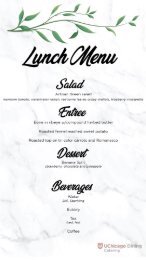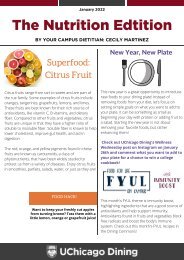You also want an ePaper? Increase the reach of your titles
YUMPU automatically turns print PDFs into web optimized ePapers that Google loves.
The Nutrition<br />
<strong>Edit</strong>ion<br />
FEBRUARY 2022
<strong>February</strong> 2022<br />
The Nutrition <strong>Edit</strong>ion<br />
BY YOUR CAMPUS DIETITIAN: CECILY MARTINEZ<br />
Superfood:<br />
Herbs & Spices<br />
Herbs and spices are often used interchangeably to describe<br />
seasonings; however, they are not the same thing. An herb is<br />
generally defined as the leaf of a plant used in cooking, such as<br />
parsley, cilantro, basil, and mint. Spices are from any part of a<br />
plant (seed, root, fruit or bark) that is dried. Some examples of<br />
spices include black pepper, cinnamon, cumin, and many more!<br />
Herbs and spices are a great way to add flavor, color, and<br />
fragrance to food with little to no sugar, salt, or fat. These<br />
seasonings also provide beneficial properties, including<br />
antioxidants and food preservation.<br />
Anti-inflammatory Properties: Turmeric, red pepper, black<br />
pepper, and ginger root have been widely studied to provide the<br />
body with anti-inflammatory benefits.<br />
Antioxidant Benefits: Rosemary, clove, sage, and oregano are<br />
excellent sources of antioxidants with their high content of<br />
phenolic compounds that can protect the body from oxidative<br />
stress and cancerous cell formation.<br />
Aids in Heart Health: Garlic, cayenne pepper, cilantro and<br />
cinnamon have been found to help lower blood pressure and<br />
cholesterol levels. Seasonings like basil, black pepper, cumin, and<br />
onion are great replacements for the taste of salt. Reducing salt<br />
intake can help lower one's risk for heart disease.<br />
FOOD HACK!<br />
Combining black pepper and turmeric together<br />
significantly increases the absorption of<br />
beneficial properties found in turmeric. Black<br />
pepper contains a bioactive compound called<br />
"piperine" that enhances the absorption of<br />
curcumin found in turmeric.<br />
<strong>February</strong> is American Heart Month, a time where we can<br />
highlight ways to take care of our hearts through food,<br />
movement, and connections. Here are a just a few steps to<br />
show self-care to your heart:<br />
Eat foods that contain healthy fats: Try to include<br />
monounsaturated and polyunsaturated (omega-3 and<br />
omega-6) fats in your diet. You can find these healthier fats<br />
in avocados, nuts, fish, and seeds.<br />
Add nuts to cereal, salads or muffins.<br />
Try avocado on toast and avocado oil in salad<br />
dressings.<br />
Eat fatty fish twice a week, such as salmon, lake trout,<br />
tuna, mackerel and sardines.<br />
Include dietary fiber: The recommended daily intake of<br />
fiber is 25-30 grams per day. A food is considered a good<br />
source of fiber if it contains at least 3 grams per serving.<br />
Make half your plate fruits and vegetables at each meal.<br />
Include plant-based foods as sources of protein,<br />
including tempeh, beans, lentils, seeds and nuts.<br />
Choose whole grains instead of refined grains<br />
whenever possible. Try popcorn, a whole grain, as a<br />
fibrous snack!<br />
Be active: Doing regular physical activity lowers blood<br />
pressure and reduces the risk of developing heart disease.<br />
It can also help you feel more energetic and relaxed.<br />
Be active in your own way by choosing physical<br />
movements that you enjoy (yoga, jogging, dancing, etc).<br />
Start with small, realistic goals and work your way up to<br />
the recommended 30-60 minutes of moderate physical<br />
activity most days of the week.<br />
Try to sit less. Walking is a movement that can help<br />
reduce stress and support heart health.<br />
Spend time with loved ones: Spending time with family<br />
and friends help reduce stress and improve mood, which<br />
directly impacts heart health!<br />
Go out for dinner with a friend or family member.<br />
Call a friend you have not seen in awhile to catch up!<br />
Get social by working out with friends and family.
<strong>February</strong> 2022<br />
This year's Love Your Body Week is from <strong>February</strong> 21st to the 25th. In<br />
celebration of body appreciation, I wanted to take this opportunity to review<br />
what it means to achieve food freedom and how this can be a part of one's<br />
way to show love to their body. "Food freedom" is defined as eliminating all<br />
diets, rules, or morality with food, allowing food to be a part of your life<br />
without controlling it. Food freedom can also be viewed as eating in<br />
alignment with your values without feeling stress, anxiety, guilt, or shame. By<br />
eliminating diet rules and restrictions, you are allowing yourself to perceive<br />
food with no moral value, meaning, no food is "good" or "bad."<br />
Food is food and nourishes the mind and body in many different ways. It has<br />
evolved to be so much more than nutrients. Food is about culture, bringing<br />
people together, and enjoying delicious combinations of taste and flavor.<br />
Bottom line: All food can be a part of a healthy diet. Practicing this<br />
approach to eating has been found to be a key component to building a<br />
healthy relationship with food. How does food freedom correlate with<br />
showing love to one's body? Practicing food freedom not only means making<br />
peace with food, but also with your body. Your body knows best, so honoring<br />
its hunger cues and cravings is a way to show appreciation and love.<br />
Here are some ways to<br />
practice self-love:<br />
Be gentle with yourself<br />
Honor your hunger cues<br />
Eat foods that improve your mood<br />
Practice joyful movements<br />
Focus on self-care over self-control<br />
Explore sustainable food habits<br />
Concentrate on overall health<br />
What works for someone else, may not<br />
work for you. Allow yourself to explore<br />
different dishes and sustainable food<br />
habits that support your mind, body,<br />
and way of life.<br />
Another way to focus on self-care over self-control is to ditch the mentality<br />
that you have to "earn" your food. This perspective suggests that the body is<br />
not worthy of being fueled unless it is earned through food restriction or<br />
physical activity. This can negatively impact one's view of food and<br />
themselves. Our bodies are worth so much more than the space we take up.<br />
It allows us to live, breathe, and change the world. Removing the focus on<br />
self-control and the association of guilt or shame with food will allow you to<br />
love and care for your body properly. We always deserve to eat, regardless of<br />
what we ate the day before. Our bodies deserve to be nourished.
<strong>February</strong> 2022<br />
GUEST SPOTLIGHT<br />
EX ECUTIVE PASTRY CHEF: CLAIRE CRENSHAW<br />
SPICE UP YOUR VALENTINE<br />
Valentine's Day is around the corner,<br />
which makes this a great opportunity to<br />
introduce sweet spice blends to your<br />
baked goods. If you think spices are only<br />
used for savory dishes, think again!<br />
Desserts can greatly benefit from spices,<br />
as they elevate flavors and aroma. Even<br />
just a small amount of spice can mean the<br />
difference between a good dessert and a<br />
great dessert. Chartwell's executive pastry<br />
chef, Claire Crenshaw, shared some of her<br />
favorite sweet spice blends and baking<br />
spice tips!<br />
Popular baking spices include cinnamon,<br />
nutmeg, and allspice. "Spices used in<br />
savory dishes can also elevate the flavor<br />
of desserts. This includes rosemary, sage,<br />
and black pepper," says Crenshaw. "One<br />
of my favorite spice pairings for<br />
Valentine's Day is pink peppercorn with<br />
orange zest. Together, they provide a<br />
floral element to the dessert. This pairing<br />
is great for shortbread." Some of<br />
Crenshaw's other favorite sweet spice<br />
blend combinations include cinnamon,<br />
ground ginger, clove, allspice, and nutmeg.<br />
Any combination of these spices will<br />
surely make any kitchen feel warm and<br />
cozy!<br />
Choosing to use a fresh or dried spice can<br />
alter how strong a flavor is. "If a recipe<br />
calls for ground ginger and you decide to<br />
use fresh, be sure to use less than what<br />
the recipe calls for," says Crenshaw. Fresh<br />
spices tend to be more potent than their<br />
dried counterparts, but do not last as<br />
long. You can ground your own spices or<br />
buy them already grinded. Be sure to<br />
label and store spices in a cool, dry place<br />
and use within six months or until the<br />
expiration date.<br />
Whether you only bake for the holidays or<br />
regularly find yourself with a whisk and<br />
mixing bowl, your spice cabinet deserves<br />
to be an essential component of your<br />
desserts. "The more spice, the better! You<br />
lose flavor of the spices as it evaporates<br />
during the heating process. Do not be<br />
afraid to use spices," says Crenshaw as<br />
her final tip. No matter how you use them,<br />
there’s no beating the smell of a spice<br />
dessert baking in the oven on a cold<br />
winter’s day.
<strong>February</strong> 2022<br />
YOUR CAMPUS DIETITAN<br />
Email: diningdietitian@uchicago.edu<br />
Cecily Martinez, MS, RD, LDN<br />
Cecily encourages students to explore the endless possibilities food has to offer. She believes<br />
food should not only be nourishing, but enjoyable. At the University of Chicago, Cecily's role is to<br />
provide nutrition education and help students feel confident in their food choices while<br />
navigating the Dining Commons. She also serves as a student advocate and a contact person for<br />
students with food allergies and special diets. Cecily is a registered dietitian nutritionist with a<br />
bachelor's and master's degree in nutrition and dietetics. She is also ServSafe and ANSI Allergen<br />
Certified. Cecily is available to assist you with any nutrition-related questions you may have.<br />
Please contact Cecily at dining-dietitian@uchicago.edu<br />
INDIVIDUALIZED NUTRITION COUNSELING<br />
UChicago Dining provides complimentary nutrition, dietary, and allergy-related food<br />
counseling so all UChicago students can meet their food goals and eat with peace of mind.<br />
Some of the areas UChicago students have access to individualized care include:<br />
Healthy and Mindful Eating<br />
Nutrition and Fitness<br />
Vegetarian and Vegan Nutrition
@uchicagodining
















